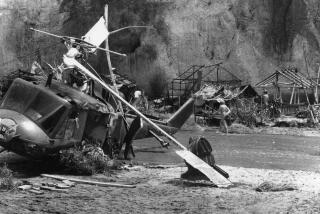Lindsay Anderson; English Film Director
Lindsay Anderson, Academy Award-winning documentarian, writer and director who prided himself on low-budget, thought-provoking films, has died in Europe. He was 71.
Anderson died Tuesday, reportedly of a heart attack suffered as he was climbing out of a friend’s swimming pool in France.
He won the Oscar in 1954 for a documentary, “Thursday’s Children.”
A man of few films, Anderson is probably best remembered for his first feature-length effort, “This Sporting Life” in 1963, and for “If,” which won the Palme d’Or in Cannes in 1968.
He received his best reviews for the 1987 film, “The Whales of August,” starring two of the industry’s grande dames, Lillian Gish and Bette Davis. “They were both quite remarkable,” he told The Times later. “And, truthfully, I was more struck by their vitality than their ages. They’re both extraordinary women. Lillian just plumps up her hair and gets on with it. Bette tends to take more time with her makeup. But she’s not concerned with looking good--only with being in character.”
Anderson’s other popular features were “The White Bus” in 1967 and “O Lucky Man!” in 1973.
Once questioned about making only six feature-length films over 20 years, the perfectionist responded: “Oh, really? I think it’s a lot!”
Anderson also directed television shows, including several episodes of “The Adventures of Robin Hood,” and theater, serving as artistic director of London’s Royal Court Theatre from 1969 to 1975. He also wrote two books, “Making a Film” in 1951 and a biography of his directing idol, “About John Ford,” in 1981.
He was one of five filmmakers asked to create a semi-autobiographical film for a BBC series called “The Director’s Place.” His film will launch the series Sept. 17.
More to Read
Only good movies
Get the Indie Focus newsletter, Mark Olsen's weekly guide to the world of cinema.
You may occasionally receive promotional content from the Los Angeles Times.










